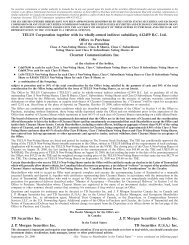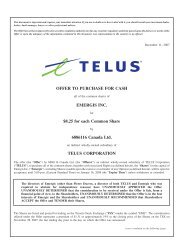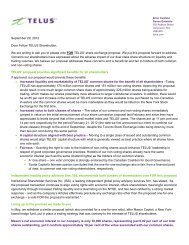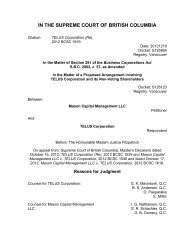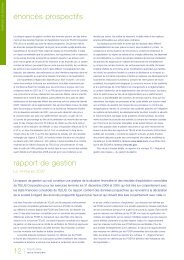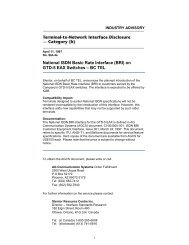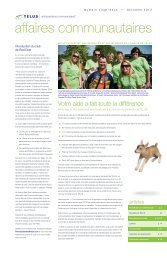Annual report - About TELUS
Annual report - About TELUS
Annual report - About TELUS
You also want an ePaper? Increase the reach of your titles
YUMPU automatically turns print PDFs into web optimized ePapers that Google loves.
RISKS AND UNCERTAINTIES<br />
The following sections summarize the major risks and<br />
uncertainties that could affect <strong>TELUS</strong> business results<br />
going forward.<br />
Competition<br />
Increased competition may adversely affect market shares,<br />
volumes and pricing in certain of <strong>TELUS</strong>’ business segments<br />
Over the next several years, it is expected that competition<br />
will remain intense. Competitors will primarily focus on the<br />
local access, data and e-business services in the business<br />
market and high-speed Internet and wireless services<br />
across both consumer and business markets. This is due<br />
to the higher growth and attractive margin potential in<br />
these areas. Long distance is experiencing flat to negative<br />
revenue growth and voice local access has low growth.<br />
However, competitors are intent on winning market share<br />
in the slower-growth large business local voice market, as<br />
they see incumbent carriers such as <strong>TELUS</strong> as having<br />
unsustainably high regional market shares.<br />
Voice and Data<br />
<strong>TELUS</strong> expects local access competition activity to<br />
increase in 2001 with the main focus on the business<br />
market. All competitors offer a varying array of long distance,<br />
local and advanced data/IP services. <strong>TELUS</strong>’ major<br />
business market competitors are increasingly bundling<br />
long distance with price discounted local access and<br />
advanced data/IP centric Web and e-commerce type services.<br />
Many <strong>TELUS</strong> competitors have built extensive local<br />
fibre-optic facilities throughout Western Canada over the<br />
last several years and in some cases have consolidated<br />
to become stronger. These competitors are increasingly<br />
focusing on marketing and revenue generation in the<br />
small and medium business market due to its more<br />
attractive margins. Some of these competitors are subsidiaries<br />
or affiliates of companies with extensive financial<br />
strength and resources.<br />
Competition is also likely to intensify in the large business<br />
market. <strong>TELUS</strong> was formerly a member of Stentor,<br />
an alliance of the major regional Canadian telecommunications<br />
companies established to facilitate the provision<br />
of long distance and data services which cross provincial<br />
and national boundaries, and to facilitate planning and<br />
coordination of the provision of national services. In 1998,<br />
the former Stentor members agreed to unwind existing<br />
arrangements and replace them with a new set of commercial<br />
agreements. These agreements contemplate an<br />
orderly wind down to the former Stentor services as the<br />
members develop their own systems and replacement<br />
products and services. It is expected that most of the<br />
former Stentor systems will be replaced by 2002. As the<br />
evolution to independent systems proceed, competition<br />
is likely to intensify for large business clients between<br />
<strong>TELUS</strong> and the former Stentor members.<br />
A second tier of new competitors has recently entered<br />
the business market. Most do not yet own any extensive<br />
local or long haul fibre-optic facilities and their operations<br />
are still largely based in Eastern Canada. However, they<br />
are expanding in varying degrees to Alberta and British<br />
Columbia. In addition, many are well capitalized and<br />
expanding their operations and marketing infrastructures,<br />
lowering prices and slowly gaining market share.<br />
<strong>TELUS</strong> has been actively building local and cross-Canada<br />
fibre-optic facilities into Eastern Canada. However, there<br />
can be no assurance that <strong>TELUS</strong> will be successful in its<br />
efforts to expand its market share in Eastern Canada or<br />
that pricing will remain at reasonable levels.<br />
Wireless<br />
Cellular competition is likely to intensify in 2001. <strong>TELUS</strong><br />
and certain of its competitors provisionally won additional<br />
digital wireless spectrum in February 2001 in Industry<br />
Canada’s spectrum auction. One of <strong>TELUS</strong>’ major competitors<br />
in Eastern Canada is expected to become a facilities<br />
based digital wireless competitor in Western Canada<br />
by building its own network and operational capability<br />
using spectrum acquired through the auction.<br />
With four major players including <strong>TELUS</strong> in the<br />
Canadian wireless marketplace, new pricing, aggressive<br />
advertising and innovative marketing approaches are the<br />
norm. Certain competitors have lowered prices in the<br />
past and may continue to do so, which could lower average<br />
revenue received per customer.<br />
Wireless competition is also coming from new digital<br />
wireless technologies that deliver higher-speed data/<br />
Internet services over current and next generation wireless<br />
devices. Such availability may also lead to increased<br />
re-subsidization costs related to the migration of existing<br />
subscribers to newer Web browser capable handsets.<br />
There can be no assurance that new services offered by<br />
<strong>TELUS</strong> will be available on time, be as versatile or as<br />
popular as those of its competitors, and that <strong>TELUS</strong> will<br />
be able to charge incrementally for the services. (See<br />
“Technological Change.”)<br />
> 55



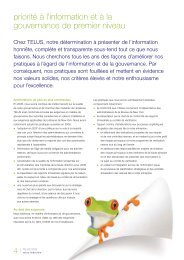
![DISK004:[98CLG6.98CLG3726]BA3726A.;28 - About TELUS](https://img.yumpu.com/16786670/1/190x245/disk00498clg698clg3726ba3726a28-about-telus.jpg?quality=85)
